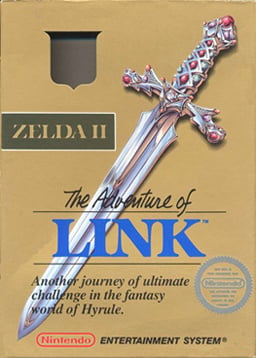Zelda II: The Adventure of Link
| Zelda II: The Adventure of Link | |
|---|---|
 
| |
| Developer(s) | Nintendo EAD |
| Publisher(s) | Nintendo |
| Designer(s) | Tadashi Sugiyama (director) Yoichi Yamada (director) Shigeru Miyamoto (producer) Akito Nakatsuka (sound composer) |
| Released | |
| Platform(s) | Famicom NES Game Boy Advance Nintendo Wii (Virtual console) Nintendo 3DS (Virtual console) Nintendo Wii U (Virtual console) |
| Article on Zelda Wiki | Zelda II: The Adventure of Link |
Zelda II: The Adventure of Link (THE LEGEND OF ZELDA 2 リンクの冒険, The Legend of Zelda 2: The Adventure of Link) is the direct sequel to The Legend of Zelda, both originally released on the Famicom Disk System in Japan and then the Nintendo Entertainment System in the US and PAL territories. While retaining many of the features of its predecessor, The Adventure of Link altered certain elements of gameplay, most notably affecting movement and combat. Traveling across a large world map (not unlike those seen in the Final Fantasy series of video games) would lead to enemy encounters which took place on a side-scrolling field of play rather than the top down perspective for which the series became known.
In the Super Smash Bros. series
The Temple stage comes from this game.
The songs "Temple" and "Great Temple / Temple" also come from this game.
Link's up (before SSB4) and down aerials are based on the upward and downward thrust, attacks that Link can use in this game.
The game is also avaible as a Masterpiece in Super Smash Bros. for Wii U.
| Masterpieces in Super Smash Bros. for Wii U | |
|---|---|
| Starter games | Balloon Fight · Donkey Kong · F-Zero · Kid Icarus · Kirby Super Star · Kirby's Dream Land · Mega Man 2 · Metroid · Pac-Man · Pilotwings · Super Mario Bros. · Super Mario Bros.: The Lost Levels · Super Mario Kart · Super Mario World · Super Metroid · The Legend of Zelda · Wrecking Crew · Zelda II: The Adventure of Link |
| Unlockable games | Dr. Mario · EarthBound · Kirby's Adventure · Punch-Out!! Featuring Mr. Dream · Yoshi |
| Japan-only games | Fire Emblem: Shadow Dragon and the Blade of Light |
